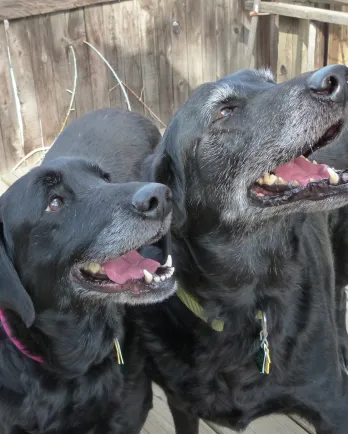Safe Harbor Lab Rescue: A Special Love for the Seniors by Jacky Eckard
Safe Harbor Lab Rescue takes in and successfully rehomes stray, abandoned or surrendered Labrador Retrievers, giving priority to those in Colorado. They are working to rescue and care for an increased number of homeless senior Labs and are committed to providing them with safe forever homes as loved companions. A grant from The Grey Muzzle Organization helps Safe Harbor Lab Rescue with their medical expenses for senior Labs. Contributor Jacky Eckard is President of Safe Harbor Lab Rescue.
Safe Harbor Lab Rescue was founded in 2002 by two women with a passion for rescuing Labrador Retrievers, Leslie and Lauren. In Leslie's case, it was also a labor of love in honor of her own Lab—and best friend—Tess, a rescue who had recently passed on at age 11 and a half. As the years have gone by, Safe Harbor has become a robust, all-volunteer group that rescues about 250 Labs a year. A total of over 2,700 have been rescued since we began almost 15 years ago.
As a group, we have a special love for the senior Labs in need of rescue. They have so much companionship to give and quiet wisdom. They are also the ones overlooked by shelter visitors. I've seen people excitedly look at a Lab at a shelter, then read the kennel card that shows the age as 7 years or older, only to hear them say, "Oh, that one's too old" and move on. But those are just the right ones for us! We are able to provide them with excellent veterinary care and loving foster homes, where they can remain as long as needed, and we find them wonderful adopters. We are very fortunate to work with a breed that is usually quite adaptable, and dogs who, after an adjustment period, do well in a new home.
One of our memorable seniors is 9-year-old Nana, a neglected stray rescued from a small rural shelter with a high euthanasia rate. When Nana arrived, she was very depressed, could barely walk, and had to be lifted in and out of the car. She had arthritis, a neurological condition that caused her eye and facial muscles to droop (Horner 's Syndrome), an anal gland abscess, dental disease, and a tumor on her back. Yet, a dog with a sweeter personality would be hard to find. Her foster mom told us: "She is not demanding; she just needs to be kissed once in a while and told what a good girl she is. It doesn't take much to make her happy." With excellent vet care, lots of TLC and physical therapy to develop strength and mobility, Nana was able to enjoy short walks. She was adopted by an amazing family, where she continues to thrive.
Many of our rescued Labs, old and young, come from shelters where, like Nana, they were abandoned strays. Others are surrendered to us due to family financial hardships, divorces, moves, a new baby, entering a nursing facility, someone passing on, or sadly just not wanting the Lab any more because they think they are a bother. Still others come to us from veterinary hospitals where they were left to be euthanized for "convenience" or due to the owner's inability to pay for the dog's care despite a favorable prognosis.
Labrador Retrievers are currently the most popular breed in the United States, but that so many are in need of rescue is a testament to the fact that a Lab is not for everyone. In today's busy world, many Labs find themselves homeless as a result of well-intentioned people who ultimately don't have the time or patience for a Lab, or have unrealistic expectations based on what they see in the media. Labrador Retrievers are a happy, people-oriented breed with many traits that make them a wonderful family companion, but they need a dedicated commitment to their training, exercise, and socialization. They also need a family who appreciates the health issues common to the breed, such as hip and elbow dysplasia, knee problems, chronic ear infections, and allergies. As Labs grow old, health care needs can mount and can become costly and inconvenient.
One of our recent senior rescues is a Black Lab named Blue. The call about him came to us one evening from the ER vet at our veterinary partner, Alameda East Veterinary Hospital. A family had come in with a 7.5-year-old Lab who had suddenly stopped eating and started losing weight. After reviewing some tests, the family realized they could not afford his care, and left the dog to be euthanized. While his prognosis was uncertain, the vet felt sure Blue could recover with patience and special care. Even as the vet had readied himself to perform his sad duty, Blue was still wagging his tail and greeting everyone in the hospital's treatment area.
Blue's vet had wondered if there was another option and a staff member suggested calling Safe Harbor. We talked at length, and decided to take Blue under our wing. There were ups and down during his recovery, but little by little Blue got better. He was eventually adopted by the veterinary technician who met him the night he came to the ER. She was determined that no matter how much time he might have left, she was going to take him home and make life wonderful for him. Today, Blue is well and with his new forever mom. "There's just something special about him," she told us.
As soon as dogs join us, Alameda East Veterinary Hospital provides them with vetting. The basics include vaccinations, a heartworm test, spay or neuter, and a microchip. Many senior Labs arrive after a lifetime of neglected health needs, and we routinely run senior blood work on all our oldsters to see if their thyroid, kidneys, liver, etc need attention. Beyond the basics, we take care of all their extra vetting needs, including ear infections, eye infections, tumors and cysts, oral surgery, skin disease, wound care, diagnostics such as x-rays and ultra sounds, and lots of pain management for arthritis or old injuries. It is amazing how many infected teeth we have extracted! In the last year, we were able to increase the number of seniors we rescued to about 30, thanks to support from The Grey Muzzle Organization. All were adopted.
Once each is vetted and has a health plan, our senior Labs head to their foster homes where they are welcomed as members of the family and remain until adoption day. Some of our fosters specialize in seniors and prefer them to the youngsters, although many of the seniors maintain the classic Lab "forever young" outlook in life!
Sometimes a pair of seniors come to us as lifelong friends and separation would cause them great distress. A senior duo is an adoption challenge, but one we meet successfully. Spanky and Alfalfa, 9 and 8 years old, came to us when they were given to a relative who then needed to move away without them. Mabel and Trible, 9-year-old sisters, found that their lifelong family could no longer keep them due to unfortunate circumstances. When no relatives wanted them, the girls—who had always had the comforts of living indoors—were left outside in a small dirt-filled pen for months, in all manner of weather. Both Spanky and Alfalfa and the girls came to Safe Harbor needing medical attention, but soon basked in love in their foster homes and were adopted to wonderful families.
We are also always there for our rescued Labs after adoption. A provision of our adoption agreement states that an adopted Lab must be returned to us if the adopter can no longer keep him or her, no matter the reason or length of time. Sara recently came back to us after nine years at age 11, when her mom was seriously injured and could not care for her. She has now happily settled in her new home.
Working together as an all-volunteer organization to rescue Labrador Retrievers is a challenging task for Safe Harbor Lab Rescue. Every Lab we rescue is a special individual, but there is a little extra measure of joy when we can help a senior. This year we have rescued 19 of them, so far ranging in age from 7 to 13 years, including a permanent foster in hospice care. We are grateful for the support of The Grey Muzzle Organization that makes it possible for us to reach out to these wonderful oldsters.
You can learn more about Safe Harbor Lab Rescue at www.safeharborlabrescue.org.
For information about all of the wonderful organizations that Grey Muzzle supports, see Who We Help.





